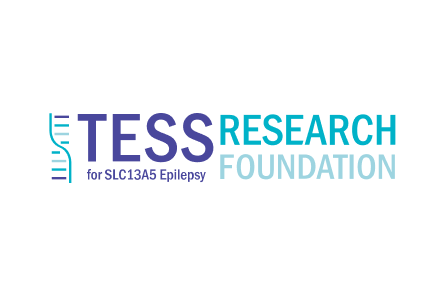TESS Research Foundation
Cycle 1
SLC13A5 Epilepsy, also known as SLC13A5 Deficiency or Citrate Transporter Disorder, is a newly discovered genetic cause of epilepsy. Most people with SLC13A5 epilepsy experience seizures, movement disorders, and developmental delay.
Last updated 04/30/2025
Clinical
Disease Class
Genetic diseases
Inherited metabolic disorder
Neurological diseases
Odontological diseases
Body Systems
Metabolic
Muscular / Skeletal
Nervous / Sensory
Organs
Bones
Brain
Ductus deferens
Fallopian tubes
Kidneys
Liver
Mouth / teeth
Muscles
Ovaries
Penis
Prostate gland
Scrotum
Testes
Uterus
Known Genetic Link
Yes, one or more genes directly cause the condition
causative_genes
SLC13A5
contributory_genes
None specified / unknown
Type of Inheritance
Autosomal recessive
Newborn Screening
No
Disease Mechanism(s)
Citrate transporter disorder
Inherited metabolic disorder
Age of Onset
Infancy (age 0-1)
Average Age at Diagnosis
Adolescence (12-17)
Adulthood (age 18-64)
Early childhood (age 1+-5)
Infancy (age 0-1)
Middle childhood (6-11)
Pre-Birth
Life Expectancy
Adolescence (12-17)
Adulthood (age 18-64)
Early childhood (age 1+-5)
Infancy (age 0-1)
Middle childhood (6-11)
Affected Sex(es)
Female
Male
National Prevalence
11-50
Global Prevalence
101-1000
National Incidence
Less than 10
Global Incidence
Less than 10
Populations and/or ancestry with higher prevalence
Middle East, Iceland
Symptoms / Phenotypes
balance problems
developmental delay
feeding difficulties
hypodontia
intellectual delay / global developmental delay
movement disorders / ataxia / tremor
muscle weakness
seizures / epilepsy
sleep disorders
spasticity
speech delay
Biomarkers
Diagnostic
· genetic testing, elevated citrate in plasma or CSF, tooth abnormalities (minimal enamel), seizures beginning in hours/days after birth, movement disorder (ataxia)
Monitoring
· neurological/physical exam, movement disorder exam/recording, sleep disturbance scale, seizure and medication log, laboratory studies (citrate levels), neuropsychological testing (Mullen, Vineland, Peabody), EEG, Global impression of change, vital signs/growth parameters, Caregiver and quality of life reports
Prognostic
· Seizure burden/EEG, MRI, development
Therapeutic
· neurological/physical exam, movement disorder exam/recording, sleep disturbance scale, seizure and medication log, laboratory studies (citrate levels), neuropsychological testing (Mullen, Vineland, Peabody), EEG, Global impression of change, vital signs/growth parameters, Caregiver and quality of life reports
Existing Therapies
Complementary and Alternative treatments
· physical therapy, hippotherapy, music therapy, occupational therapy, speech therapy, augmentative communication
FDA-Approved for Symptom Relief
· antiseizure medications, behavior medications (eg atypical antipsychotics), movement disorder medications (for dystonia)
Off-Label Drug Use
Organizational & Research
Cell Lines
Fibroblasts
iPSCs
NPCs
Cell Lines, Institution
Baylor College of Medicine
Neurolentech
University of North Carolina (UNC)
Cell Lines, Involvement
Consulted
Funded
Own
Cell Lines, share
Some of our cell lines are freely available
Disease Model
Drosophila/fly
Mouse
Zebrafish
Disease Model, Involvement
Consulted
Funded
Own
Disease Model, share
Some of our disease models are freely available
Clinical Trial Role
Data sharing
Focus group
Funding
Meeting with regulators
Outcome measures, development
Recruitment and outreach, patients
Recruitment and outreach, trial sites/physicians
Results dissemination, publication
Study material design, review (not protocol)
Study protocol design, review
Travel coordination
Biobank, Institution
Baylor College of Medicine
CCR Fertility
Coriell Institute
Stanford University
University of North Carolina (UNC)
University of Texas Southwestern Medical Center (UTSW)
Biobank, Involvement
Consulted
Funded
Own
Center of Excellence, Institution
None
Registry
Yes, we have a registry that we created
Data Collected, Registry
Genetic data
Patient contact info
Data Entered by, Registry
Patients
Platform, Registry
REDCap
Natural History Study
Yes, we have a natural history study that we created
Data Collected, Natural History Study
Clinical endpoints (outcomes)
Electronic health records/electronic medical records
Genetic data
Imaging data
Medication usage
Patient-reported outcomes
Prospective data
Retrospective data
Platform, Natural History Study
Beneufit
Ciitizen
REDCap
FDA Patient Listening Session
No
FDA Patient-Focused Drug Development (PFDD) Program
No
ICD Codes
Yes, we have an ICD-10 code specific to our exact disease
Diagnostic Guidelines
Yes, we have guidance available on our website
Science Advisory Board Policies
Yes, willing to share SAB policies
Research Network Policies
Has CRN and willing to share policies
Research Roadmap
Yes we have a Research Roadmap, and will share policies
International Chapters
None
International Partners
None
